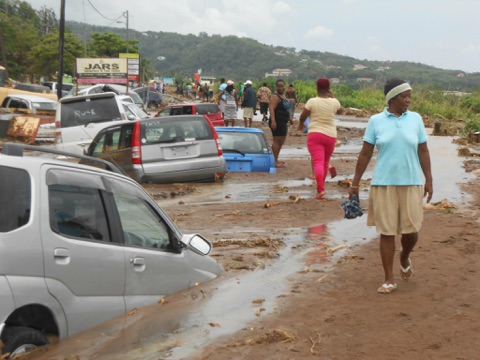
Following the disaster wreaked by Tropical Storm Erika Aug. 26, a University of Mississippi faculty member from Dominica is joining Ole Miss alumni from the West Indies island to ask the public to respond to their homeland’s desperate cries for help.
“Tropical Storm Erika struck Dominica and dumped 12 inches of rain in one day,” said Cecille Labuda, UM assistant professor of physics and astronomy. “I’d like to appeal the UM family and people everywhere to contribute to the relief effort because without help from the outside world, Dominica really has no chance for recovery.”
Massive landslides and rivers breaching their banks destroyed much of the infrastructure, including roads, bridges and airports. Many private homes were also destroyed and parts of the island are cut off and only accessible by fishing boat. Thirty-five people are confirmed dead and many are missing in the landslides.
“In the best of times, Dominica struggles to maintain its economy,” Labuda said. “The economy is based on agriculture and tourism, two revenue streams that are now essentially unavailable. Because of its small, 70,000-person population (barely more than the number of people that fit in Vaught-Hemingway on a game day), there is not much of a tax base. All of this makes rescue and recovery efforts very difficult.”
According to Nosa Egiebor, senior international officer and executive director of UM’s Office of Global Engagement, no Dominican students are enrolled at UM this semester.
“We did have several students from Dominica at one time, but for some reason there have not been any here in recent years,” said Egiebor, also a chemical engineering professor. “While I don’t know of any campuswide fundraising activities for Dominican relief, our office certainly stands ready to support any such endeavor once it has begun.”
Labuda estimated that the total number of Dominican students who attended UM is between 40 and 50.
“This is my guess based on when I was a student, and I knew them all,” she said. “This is actually quite a large number for a country of total population 70,000.”
Two Dominican UM alumni have been directly impacted by the disaster.

“The extent of the devastation is monumental,” said Roosevelt Skerrit, a 1997 UM graduate who has served as prime minister of the island country since 2004. “It is far worse than expected. Already, friends of Dominica are calling me to offer their help to start a campaign to raise funds and make donations to bring immediate relief to those who have been drastically affected by this storm.”
Chemical engineering alum Sabrina Bully was also shaken by Erika’s effects.
“It was a harrowing experience for me to see suffering on such a grand scale,” Bully said. “My heart and soul grieve for my beloved people.”
The nation’s government has set up several accounts for contributions (http://www.opm.gov.dm/?p=1058) and endorsed gofundme campaigns listed on the official government of Dominica website (http://www.opm.gov.dm/?p=1106).
The Commonwealth of Dominica, Ontario Association has created one of these online campaigns. Since its inception, CDOA’s campaign (http://www.gofundme.com/DA-ErikaReliefFund) has received $18,907 of its $100,000 goal.
Skerrit said he sees hope for Dominica in the aftermath of the storm.
“We are a resilient people,” he said. “We have experienced national disasters on many occasions during the last 400 years of our history. The lessons we have learned from that experience is that when we pull together as one nation, nothing can stop us. Let us treat the devastation of Tropical Storm Erika as a wake-up call to do things differently.”
The damage the island suffered from flooding has been as bad, if not worse than damage inflicted by wind from far more powerful hurricanes, according to CDOA’s website.
“The rapid North American news cycle may move on to the next story, but that does not mean you should,” the site states. “Dominica will continue to feel the effects of this disaster for a long time. We ask you to stand by Dominica as it starts and continues the process of recovery.”
Courtesy of Edwin Smith and the Ole Miss News Desk
